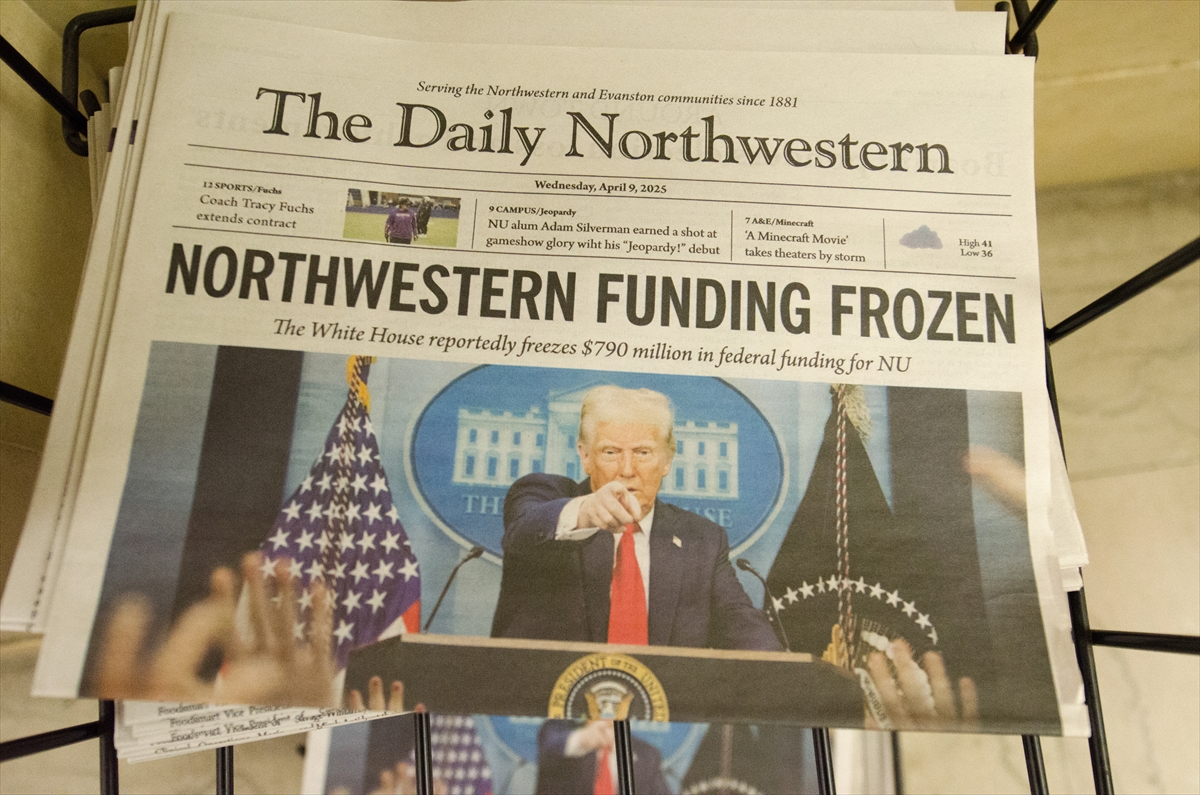
Headline of The Daily Northwestern, April 9, 2025 – Anadolu Agency
The policy is one of several measures enacted against higher education institutions during Trump’s presidency. Under this initiative, some universities saw their federal funding suspended, revoked, or made contingent on compliance with government demands. These actions were primarily justified by the universities’ responses to campus protests, diversity and inclusion programs, and federal expectations regarding efforts to combat antisemitism.
Scope and Framework of the Policy
In 2025, the Trump administration moved to restrict federal funding for specific universities, citing concerns over pro-Palestinian protests on campus, perceived shortcomings in tackling antisemitism, and objections to Diversity, Equity, and Inclusion (DEI) initiatives.
To implement the policy, federal investigations were launched to examine how institutions were using federal funds. These investigations were conducted by the U.S. Department of Education under Title VI of the Civil Rights Act. On March 14, 2025, the Department’s Office for Civil Rights announced that it had opened Title VI investigations into 45 colleges and universities. As a result, hundreds of millions of dollars in grants, research contracts, and federal project funds were put on hold.
The administration issued a series of demands to affected institutions. These included reassessing DEI programs, banning masks during campus protests, reporting code violations by international students, withdrawing recognition from certain student organizations, and placing oversight on specific academic departments.
Officials warned that failure to comply with these conditions would result in the withdrawal of federal support. Harvard University was the first to reject the administration’s demands. Other institutions named in the funding freeze or cutbacks included Columbia, Cornell, Northwestern, Brown, Princeton, and the University of Pennsylvania.
Universities Affected by the Funding Cuts
Columbia University
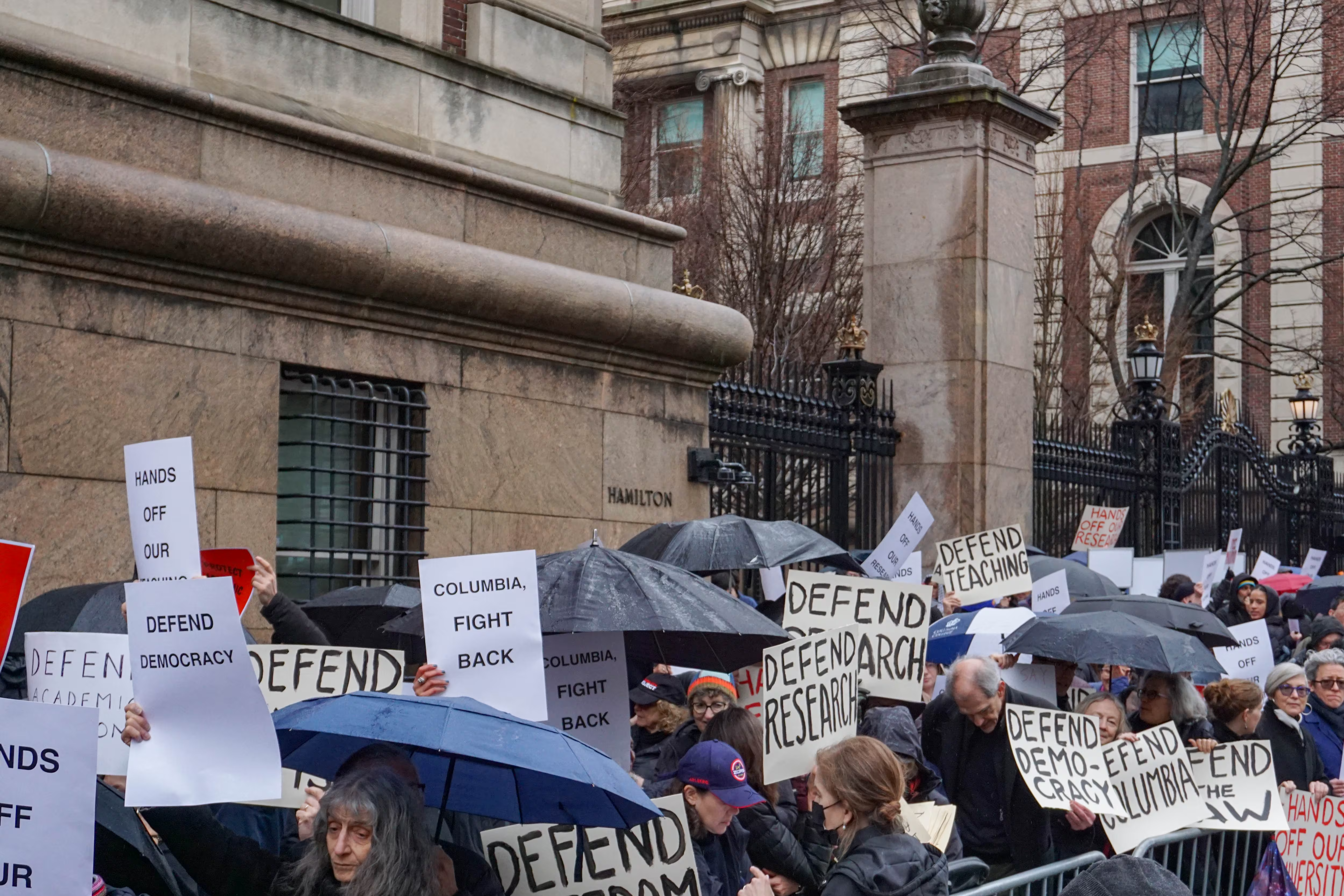 An image from the protests held at Columbia University, March 26, 2025 – Columbia Spectator
An image from the protests held at Columbia University, March 26, 2025 – Columbia Spectator
Columbia University was one of the first higher education institutions targeted under the Trump administration’s federal funding interventions. On March 3, 2025, federal agencies issued a “stop-work” order concerning approximately $51 million in active contracts. Just days later, on March 7, around $400 million in federal support to the university was officially withdrawn.
This decision was largely influenced by pro-Palestinian demonstrations held on Columbia’s campus throughout 2024. During the protests, numerous students were detained, and university president Minouche Shafik subsequently stepped down. The Trump administration characterized these events as instances of “antisemitic harassment and violence.” Following the funding cut, Columbia implemented several measures to align with federal demands. The university placed its Middle Eastern Studies department under administrative review, hired new security personnel, prohibited mask-wearing during demonstrations, and suspended recognition of certain student groups. On March 21, 2025, Columbia announced a broader set of institutional reforms, including a review of curricula and governance in several international studies departments and the appointment of a new senior administrator.
Acting President Claire Shipman, in a statement dated April 15, 2025, acknowledged that while the university had accepted some of the federal demands, it would reject any measures perceived as undermining institutional autonomy. Around the same time, several faculty groups filed lawsuits challenging the administration's interventions.
Harvard University
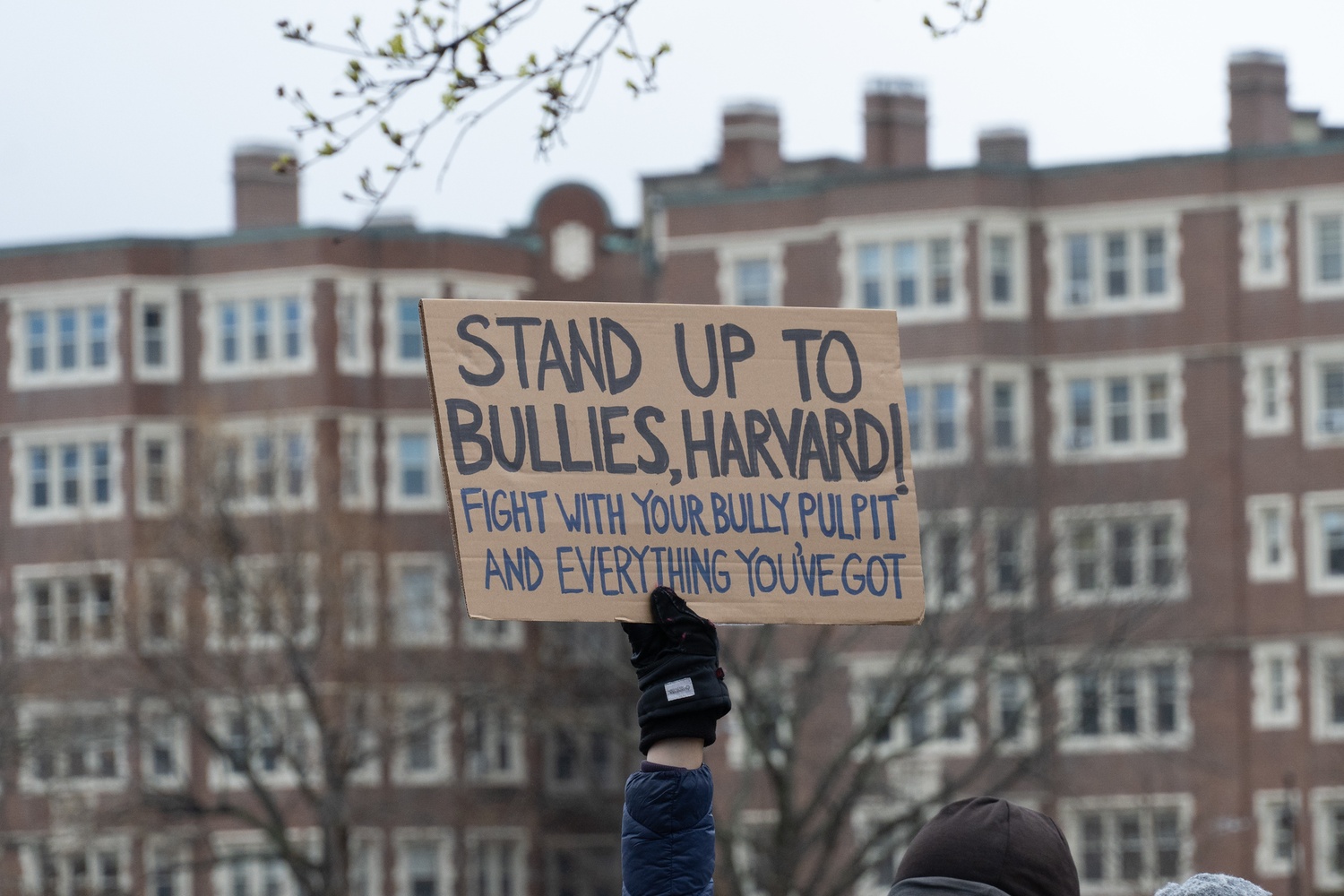
A banner reading “Stand Up to Bullies” at a protest held at Harvard University, April 13, 2025 – The Harvard Crimson
Harvard University was directly targeted by the Trump administration after refusing to comply with federal demands regarding campus policies. The administration ordered the university to suppress pro-Palestinian protests and dismantle its diversity, equity, and inclusion (DEI) initiatives. On April 3, 2025, the U.S. Department of Education sent Harvard a formal letter outlining specific requirements. These included a ban on masks during protests, restrictions on student demonstrations, derecognition of certain campus organizations, and a restructuring of the university’s leadership. Harvard President Alan Garber rejected the demands, issuing a public statement in which he described them as unconstitutional and incompatible with the university’s principles.
Following Garber’s statement, the Trump administration froze $2.2 billion in federal grants and an additional $60 million in contracts—amounting to a total of $2.3 billion in suspended funding. The administration also launched an investigation into the university’s use of more than $8.7 billion in federal funding, aiming to determine whether the funds had been managed in compliance with civil rights laws. Harvard faculty responded by filing legal challenges to the investigation.
On April 15 and 16, 2025, Donald Trump published multiple posts on Truth Social asserting that Harvard had “lost its way” and should no longer receive federal funding. He also suggested that the university’s tax-exempt status could be revoked.
Cornell University
As of April 2025, Cornell University became one of the higher education institutions subject to a federal funding freeze. Under civil rights investigations carried out by the Trump administration pursuant to Title VI, more than $1 billion in federal funds allocated to the university were suspended.
As part of the freeze, the Department of Defense issued over 75 “stop-work orders,” affecting various research contracts. These orders impacted ongoing projects in cybersecurity, healthcare, and national defense. In a public statement, Cornell noted that it had not received any formal notification regarding the funding suspension but had learned of the decision through media reports. The university added that it was seeking clarification from federal officials regarding the basis for the decision.
On March 10, 2025, the U.S. Department of Education sent letters to more than 60 universities, including Cornell, urging them to implement additional measures to ensure the safety of Jewish students on campus. The letter warned that failure to meet these expectations could result in further sanctions. In an article published in April, Cornell University President Michael Kotlikoff emphasized that the institution would continue to uphold freedom of expression and public discourse, regardless of outside pressures.
Northwestern University
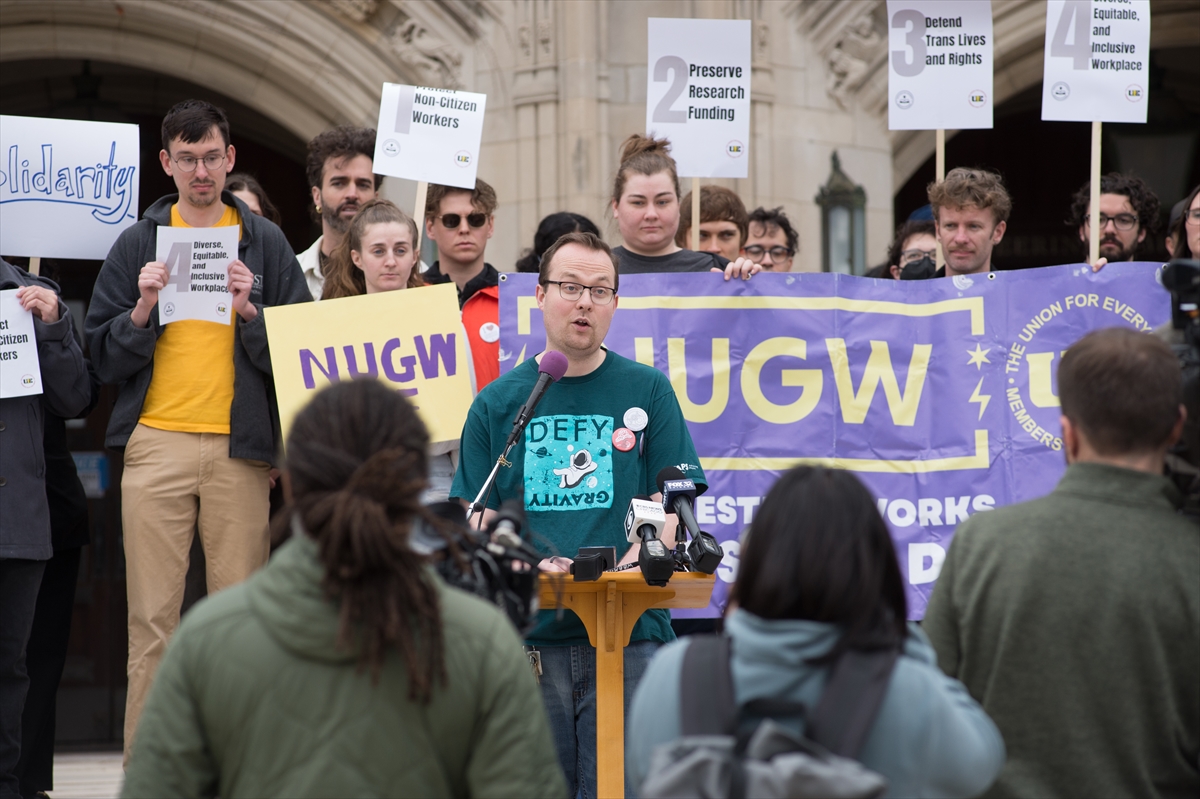
Northwestern University students protest Trump’s higher education policies, April 18, 2025 – Anadolu Agency
Northwestern University was also included among the institutions whose federal funding was frozen by the Trump administration as part of ongoing federal investigations. Approximately $790 million in federal support was halted due to what the administration described as pending civil rights inquiries. The university stated that it had not received formal notice of the funding freeze but was cooperating with federal agencies involved in the investigations. It explained that most of the affected funds were allocated to research projects in medicine, engineering, and the life sciences. Among the potentially impacted work were high-profile innovations such as a light-powered pacemaker and immune-based therapies for Alzheimer’s disease, both developed by Northwestern researchers.
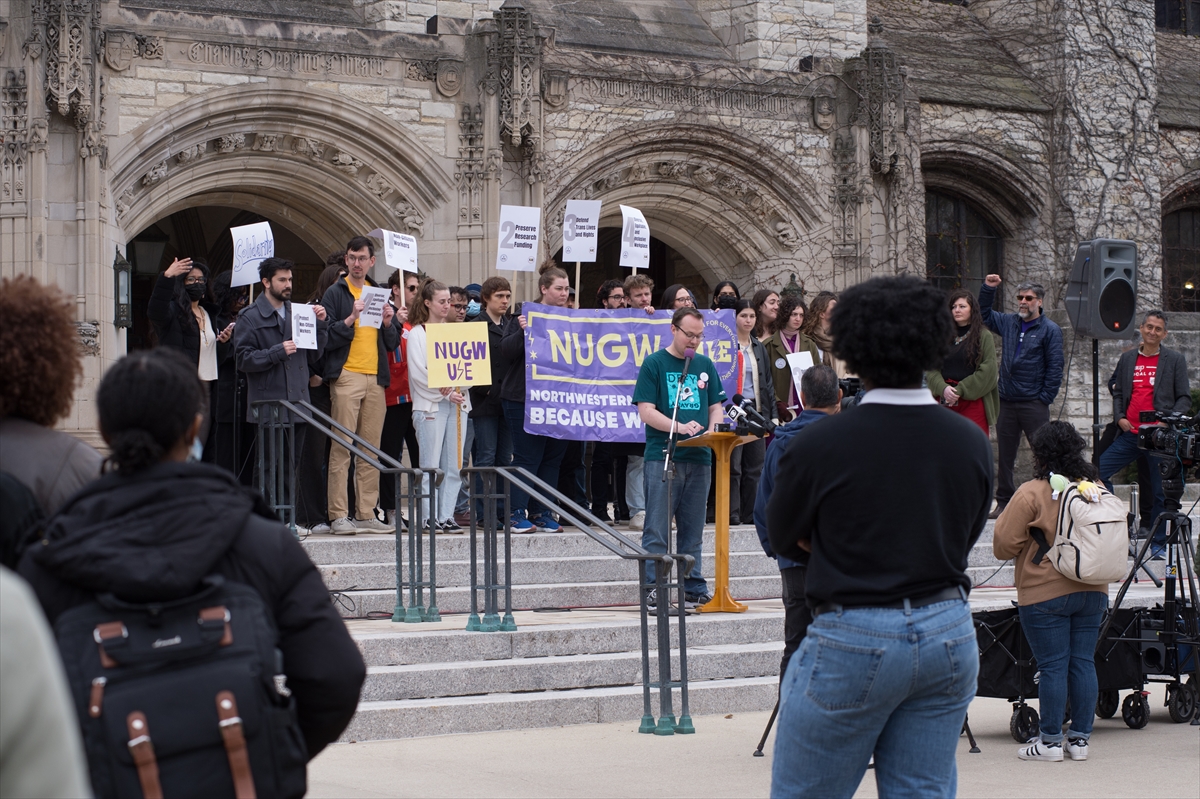
Northwestern University students protest Trump’s higher education policies, April 18, 2025 – Anadolu Agency
In response to the funding freeze, students and faculty organized demonstrations on the university’s main campus in Illinois. Protesters called on the university administration to defend the rights of students and academic personnel. During these protests, participants criticized the Trump administration’s use of antisemitism as a justification for broader interventions in higher education. Student representatives argued that the policies endangered not only specific identity groups but also freedom of expression and due process. Some faculty members framed the administration’s actions as part of a nationwide campaign to reshape higher education. University official Mark Hoffman added that changes to student visa regulations and federal student aid policies were also elements of this broader agenda.
Princeton University
On April 1, 2025, the Trump administration suspended multiple research grants awarded to Princeton University by agencies such as the U.S. Department of Energy, NASA, and the Department of Defense. In a formal statement issued on April 9, 2025, the U.S. Department of Commerce announced that three climate-related research projects at Princeton were deemed inconsistent with the current objectives of the National Oceanic and Atmospheric Administration (NOAA), and that approximately $4 million in funding would be cut.
The statement further claimed that the projects in question were promoting “exaggerated and unreasonable climate threats.” As a result, the funding cuts were scheduled to take effect on June 30, 2025, with the administration projecting millions of dollars in federal budget savings. In an internal communication to faculty, University President Christopher Eisgruber confirmed that funding from several federal agencies had been suspended and noted that the administration had not provided a clear rationale for the decision. He also reiterated Princeton’s ongoing commitment to combating antisemitism and all forms of discrimination.
Brown University
Brown University faced the threat of a significant funding cut as part of President Donald Trump’s antisemitism-related policy agenda. According to sources within the White House, the administration was preparing to halt $510 million in federal grants and contracts awarded to the university. As part of ongoing investigations by the U.S. Department of Education, Brown was identified as one of over 50 higher education institutions under review for alleged incidents of antisemitic harassment and discrimination. Criticism directed at the university increased following pro-Palestinian demonstrations held on campus.
The Trump administration assessed that Brown had failed to implement sufficient administrative measures in response to a wave of campus protests that began at Columbia University and spread to more than 50 other institutions. It was reported that over 3,100 individuals had been detained in connection with these demonstrations. In an internal email to staff, university official Frank Doyle acknowledged awareness of the Trump administration’s critical stance on funding support. However, the message did not confirm or deny any official notification regarding the suspension of funds.
University of Pennsylvania (UPenn)
In the third week of March 2025, the Trump administration announced that it was suspending approximately $175 million in federal funding to the University of Pennsylvania. The affected grants and contracts were issued by the Department of Defense and the Department of Health and Human Services.
The university stated that it had not received direct notice of the funding suspension and requested official clarification on the rationale behind the decision. The frozen funds were designated for a range of programs, primarily in the fields of biomedical research and public health.


